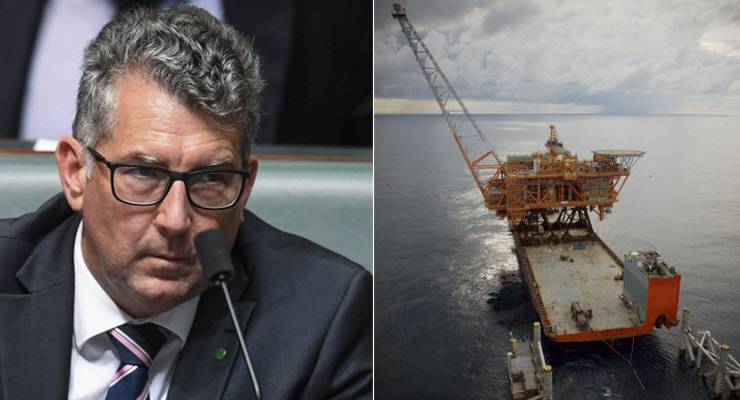
Political donations are a blunt instrument for wielding power and influence — there’s no guarantee that putting money into political hands will result in favourable treatment.
Yet Woodside Energy has a history of getting what it wants from governments.
New figures revealed this week show just how much the oil and gas industry has funnelled into the nation’s major political parties, and Woodside is the biggest spender of them all.
It has spent almost $2 million in political donations over the past two decades, analysis by the Centre for Public Integrity shows.
The resources industry has spent $137 million (if you include Clive Palmer’s donations to himself), making the sector the biggest donor in the country. And this doesn’t include undisclosed donations under $14,000, or donations that have been paid through third party lobby groups.
Woodside’s cash splash has coincided with a run of favourable decisions from governments, most recently a marketing pledge from Prime Minister Scott Morrison that a gas-led recovery would pull Australia out of the COVID recession.
Woodside is also part of an industry that has benefited from a range of measures including tax exemptions that have propped up oil and gas, something critics say has come at the expense of meaningful action on climate change.
Its access to powerful decision-makers has also allowed it to secure some big wins.
Conservation Council of Western Australia executive director Piers Verstegen says when it comes to wielding power and influence Woodside is in a class of its own.
“Woodside, generally speaking, has been very successful at operating behind the scenes and going undetected in the way it influences public opinion,” he said.
“It’s had an extraordinary influence on the Commonwealth government, particularly around climate change policy and the way gas is treated as part of the government’s climate change response. And this goes back a number of decades.”
Political donations are just one expression of how the oil and gas industry has become enmeshed in the political establishment, Verstegen said. A revolving door between the industry and senior government officials is another.
And while it’s impossible to draw a direct line between donations and political outcomes, it has tilted the board in its favour, with Centre for Public Integrity chair and former NSW Supreme Court judge Anthony Whealy QC calling for urgent reform.
“This is not a level playing field — it’s anything but,” he said.
The Australian Electoral Commission is due to release its annual disclosure data from parties and donors in coming weeks. Meanwhile a federal inquiry into political donations is under way, with submissions due January 29.
So what do you get for political donations? Here are some times Woodside got its way:
- In 2004 the Howard government used ASIO to bug the offices of the Timor Leste cabinet to get an edge in negotiations over access to the Greater Sunrise gas fields, benefiting Woodside and its shareholders. This has led to the extraordinary prosecution of Canberra lawyer Bernard Collaery and Witness K for helping expose the bugging
- In 2019 Woodside successfully lobbied the Western Australian government to dump its environmental protection authority guidelines that would recommend large projects be carbon neutral
- In 2019 the WA environmental protection authority allowed Woodside to retrospectively amend existing licences relating to its Burrup Hub gas project, meaning it can process gas from any source rather than two sources. Environmental groups say the changes are unlawful and are challenging them in court
- In 2020 Resources Minister Keith Pitt handed Woodside $8.8 million to advise the government how to clean up its own abandoned production oil vessel in the Timor Sea.
Crikey asked Woodside it felt like it got value for money for its big political donations spend.
A company spokesperson said its reported donations related to memberships of business forums and events “at which we exchange information and views essential to mutually informed decision making”.








“Woodside is the biggest spender of them all. It has spent almost $2 million in political donations over the past two decades”
Woodside is also the biggest beneficiary of them all. It and its Greater Sunrise partners were gifted $12bn of gas by the Howard government. That gas was an Australian public asset.
Is that a coincidence, is that mere corruption or is that treason? The inquiry into political donations had better publicly start with the big questions.
ASiS, not ASIO, bugged the EastTimor Cabinet Room.
And Director General of ASIS allegedly conspired with others in the ACT to defraud Timor and Australia in breach of the ACT Criminal code.
The Director General of Intelligence Services did not publicly report this. No prosecution has been brought and no explanation provided.
This barely scratches the surface. Look at how many former Libs are now on the payroll of Woodside, undoubtedly sinecures by another name. A few Labor miscreants in there too. Alexander Downer held substantially paid positions with them.
If it looks like a duck, and quacks like a duck …
Yep, and let’s not forget Downer’s ex departmental head gifted board membership at Woodside! Or Fraudenberg’s touting benefits of the Greater Sunrise project – on site in Dili – whilst he was a director of Deutsche Bank – a player in a Sunrise funding consortium.
Georgia, perhaps next article provide a breakdown of Lib v Lab donations, this would be interesting to compare. Guessing the Greens haven’t accepted Woodside donations?
There is a criminal offence of unexplained wealth – any political expenditure must show the source of the funds used.